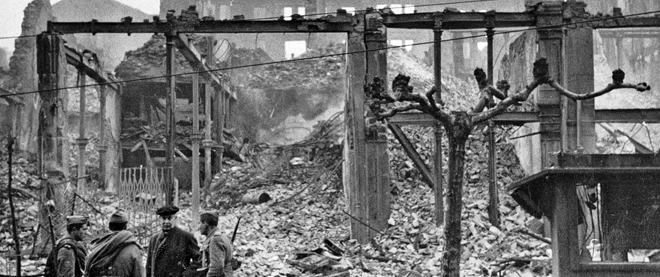Spanish fiction informed by fact
Carlos Ruiz Zafon’s characters pull memory out of the shadows of the past
Three Lions/Getty Images
Share

Barcelona in 1957 seemed very different from the place he last saw two decades before, muses one of the characters in Carlos Ruiz Zafon’s new novel, The Prisoner of Heaven. The city streets “looked very changed without the dead bodies.” A handful of the Spanish writer’s characters are prone to remarks like that—pulling the memory of their country’s murderous civil war of 1936 to 1939 out of the shadows—and they almost always say it within a few pages of someone else declaring that it’s best to let the past lie buried. It’s a theme that Prisoner, the sequel to Zafon’s 2001 international bestseller The Shadow of the Wind (15 million copies sold), carries on from its predecessor. “We are what we remember,” says Zafon over the phone from his home in Los Angeles, where he lives for half the year. “The struggle for memory is the struggle for identity and power. It’s a central artistic issue of modern times.”
Nowhere in the modern West is that struggle more acute than in Spain. Set in Zafon’s native Barcelona, and moving back and forth over two decades beginning in 1945, the story begun in Shadow and continued in Prisoner is a sumptuous, thoroughly modern reimagining of classic 19th-century novels. Dumas, Verne and Conan Doyle jostle for influence with Borges, Eco and Garcia Marquez in an engrossing read replete with plot twists, gory crimes, foul villains and doomed love affairs. People and historical allusions keep disappearing and reappearing, with protagonist Daniel Sempere encountering enough of both to wonder whether his memory-wiped world is only “a stage setting.” Daniel, just 10 as the story begins, has no sense of how his nation came to its grey and repressive state, because six years earlier his dying mother convinced his reluctant father to promise to keep all awareness of the war’s atrocities from their child.
Knitting together all these elements is the mysterious book depository known as the Cemetery of Forgotten Books. The author’s unifying metaphor, the cemetery contains a copy of every volume (“meaning every idea and thought,” Zafon adds) that has slipped from consciousness in the outside world, holding its “soul” in trust for the day someone rediscovers it.
When Zafon was writing Shadow, during the late 1990s, Spain’s “pact of silence” still held. Three years of civil war had been followed by four decades of right-wing dictatorship, and during Spain’s fragile transition to democracy after Francisco Franco’s death in 1975, victors and vanquished entered into a tacit agreement not to stir the national demons. Central to the pact was the 1977 amnesty law: there have not been any prosecutions for wartime or postwar atrocities by either side, and nothing was done about the tens of thousands of Franco victims lying in unmarked graves. Other artists have also explored repressed historical memory: a powerful scene in the Oscar-wining film Pan’s Labyrinth has those about to kill a Francoist officer tell him that his newborn child will never know his father’s name.
The pact of silence was broadly accepted across Spanish society, including by Zafon, who calls it “the right choice at the time, a strategic decision that brought us the longest stretch of peace and prosperity in modern Spanish history.” But it has shattered in recent years—they are literally digging up the graves in Spain. The very peace and prosperity that followed the pact eventually undermined it. Despite the furious right-wing reaction, contemporary Spaniards no longer fear demands for justice will spark renewed civil war. In 2007, the government, under pressure, released a map of the 2,000 known communal graves.
Zafon, no partisan—one of his villains was a wartime torturer for the Communists before moving to the winning fascist side—doesn’t expect an entirely happy outcome from letting the past breathe. Still, the decade of change in Spain between Shadow and Prisoner is reflected in the latter: different versions of history clash more openly and more long-buried truths are revealed. More volumes, in fact, emerge blinking into the daylight from the Cemetery of Forgotten Books.